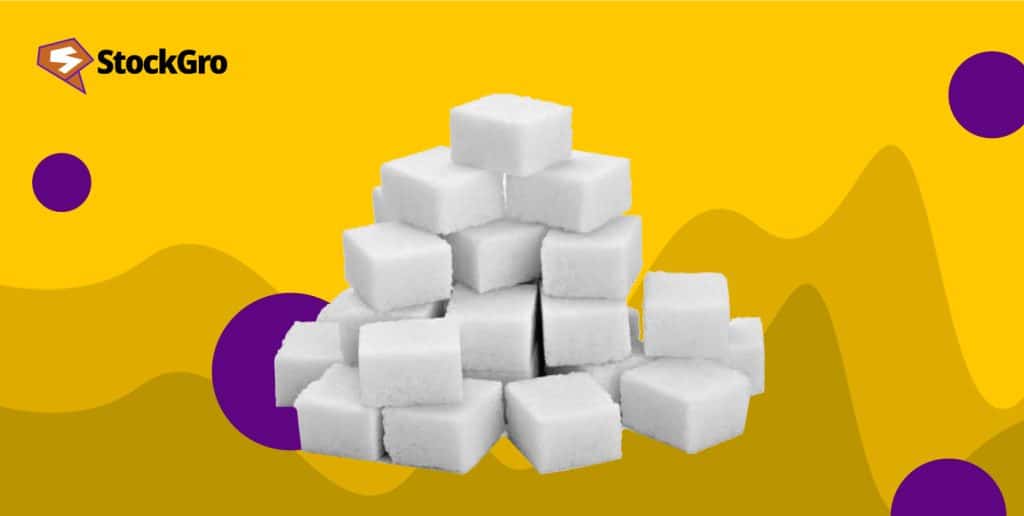
The government is in discussion about increasing the minimum selling price, i.e., MSP for sugar. This news has gained traction amongst the market watchers. Thereby many sugar sector stocks are in the surge, with a 15% boost over two days.
Why is this rally? How will MSP impact the sector by large? And who are the potential gainers? Let’s find the answers.
What is MSP?
Agriculture is the backbone of our country. Unfortunately, the farmer’s income is dependent on market movement. To protect the interest of the farmer, the government has introduced the concept of MSP.
It is the minimum ceiling at which the government buys the produce from the farmers. MSP acts as a safety net from heavy losses when the market fluctuates.
This price is recommended by the Commission for Agricultural Costs and Prices or CACP. The commission was established in 1965, as a part of the Agriculture Ministry.
How do they determine the price? They take into account factors like cost of production, demand and supply, and market trends. Although the CACP determines the price, the final decision is taken by the Prime Minister’s cabinet committee on economic affairs. This system helps maintain a stable agricultural economy.
News on MSP
As the new cabinet for 2024 has formed, the recent news on sugar MSP is surfacing. The government will be in talks soon to increase the MSP for sugar for the 2024-25 season.
The MSP for sugar right now is ₹31/ kilogram (kg). It’s the same rate since 2019. However, the sugar industry experts are expecting the MSP to go up to ₹40-41 per kg. Reports say the government might raise the MSP, but it probably won’t touch the industry expectations.
Similar to MSP, there’s another rate called Fair and Remunerative Price (FRP). It is the minimum price that sugar mills are legally required to pay the sugarcane farmers, ensuring they cover their production costs and earn a fair profit. So when FRP increases, MSP also naturally increases.
Recently, before the Lok Shaba election 2024, the PM’s economic affairs cabinet committee approved a 7.4% hike in the FRP, meaning an extra ₹25. This brings the FRP for sugarcane to ₹340/100 kg for the 2024-25 sugar season, which spans from October to September, with a baseline recovery rate set at 10.25%.
This news also coincides with the country’s progress in ethanol blending. Ethanol is a byproduct of sugar production. By increasing the ethanol in fuel, the dependency on fossil fuels consequently decreases, contributing to the greater good. Recently, India has achieved a 15% ethanol blending target and is seeking 20% by 2025.
To know more: Sugar stocks sour as government raises fair price to ₹340/quintal
Sugar industry overview
The sugar industry is an important agri-commodity sector in India. Globally, we are the largest producer and consumer. This dual role tells the importance of the industry. About 5 crore farmers depend on sugarcane cultivation and it provides direct employment to over 5 lakh workers in sugar mills across the country.
Sugar production involves multiple stages. It starts with sugarcane farming and ends with sugar refining. The industry also supports numerous ancillary activities. These include transportation, machinery servicing, and agricultural input supply. This extensive network amplifies the sector’s economic impact.
When we look at the current situation, the performance was mixed. For example, in the state of Uttar Pradesh, due to the red rot disease, the crushing activities was down by 10% year-on-year in the 2023-2024 season. But in the same season, Maharashtra production jumped from 11 million metric tons (MMT) from 10.5 MMT. And overall the sugar recovery rates improved, standing at 10.09%.
End of May 2024, sugar output was standing at 31.7 MMT, around 0.9 MMT down compared to the previous season. On the whole, the crushing activity also fell by 5.4%, from 332 MMT to around 314 MMT.
Here are the best sugar stocks based on market capitalisation.
| S.No. | Name | Mar Cap (₹ Cr.) | Stock price(₹) | Net profit (₹ Cr.) |
| 1 | EID Parry | 12923.28 | 728 | 294.3 |
| 2 | Sh. Renuka Sugar | 10461.53 | 49.15 | -111 |
| 3 | Balrampur Chini | 8679.25 | 430.2 | 203.39 |
| 4 | Triveni Engg. Ind. | 8631.15 | 394.3 | 161.04 |
| 5 | Bajaj Hindusthan | 5312.54 | 41.59 | 90.56 |
Also read: The past, present, and future of the Indian agriculture industry
Market reaction to sugar stocks in India
For the past one month sugar industry stocks have been on a bullish trend, varying between 10% and 20%. After hearing about the potential MSP hike for the 2024-25 sugar season, several sugar stocks are seeing notable price movements.
As of Friday, 14 June 2024 closing the below stocks were the gainers: Bannari Amman Sugars rose 7.83%, while KM Sugar Mills by 7.23%. Similarly, Sakthi Sugars also had a 5.58% gain. Other top gainers included DCM Shriram Industries and Ponni Sugars.
But not all sugar sector stocks did well. Rajshree Sugars & Chemicals dropped by 2.63%, and Simbhaoli Sugars fell by 2.11%. Balrampur Chini Mills, despite being a topper in market capitalisation, saw a decrease of 2.04%. Rana Sugars and Dhampur Sugar Mills also faced losses on Friday closing.
Overall, the market felt positive about the sugar stock news. The Nifty50 index ended the session up by 66.7 points at 23,465.6. Similarly, the Sensex also closed 181.87 points higher at 76,992.77.
You may also like: The role of the energy sector in powering India’s growth.
Bottomline
The news of a potential MSP hike for sugar has attracted market enthusiasts. As the government finalises its decision, investors remain watchful, expecting major impacts on the sugar stocks. For future investing decisions, staying informed and taking all factors into account are essential.

